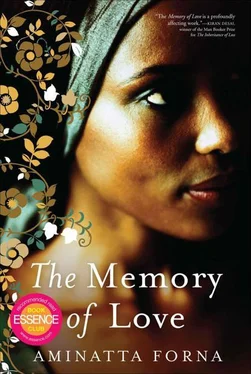Exhausted. Still, Kai hadn’t wanted to go home where the church meeting would be under way. He’d passed by Adrian’s apartment, found the place empty, showered and changed back into his day clothes, rummaged through the fridge. Nothing. Too much effort to send someone out and begin to cook, and in no mood for the canteen, he’d decided at last to go home.
The traffic is slow, the poda poda in which he travels inches its way around another of its kind, broken down in the middle of the road. Traffic passes either side like a sluggish river around a rock.
Some time after eight Kai slips through the gate and makes it to the back of the house unobserved. There he takes a beer from the fridge and carries it out to the yard, where he sits in the half-darkness. From the front verandah come the booming words of the preacher, florid and false. He can see the preacher in his mind’s eye: the peanut head, myopic gaze, striped suit, leather-soled shoes. His cousin’s folly. He takes a gulp of beer. It is warm and gassy. He scratches his scalp, which has now begun to itch, and slaps at a mosquito. He drains the first bottle of beer and goes in search of another one. Within a couple of minutes the second bottle is half empty. From his room he fetches a tape recorder, sits with it under the banana tree buzzing the tape back and then forward, trying and failing to locate a song to suit his mood.
Abass appears before him, dressed in his pyjama bottoms.
‘Guess what I saw today,’ says the boy.
‘Not now, Abass.’ He swallows from the bottle. Hunger has been replaced by thirst.
Abass presses on. ‘I saw the fifty orange monkeys, they came to my school.’
‘I said not now!’ The words come fast and harder than Kai intended. He sees the boy blench. Abass freezes, his mouth hangs open, the remainder of a smile upon his lips, eyes liquid bright. He is uncertain whether his uncle is joking. Kai continues to sit, staring at the top of his beer bottle and breathing hard to control a sudden inexpressible anger. ‘Go to bed. Go on,’ he says in a low voice.
By the time he recovers himself it is too late. The boy has fled. He is into his third bottle of beer when he remembers the man with the spinal injury. The family must have been waiting to speak to him and he had forgotten.
By his fifth bottle of beer he is drunk, and still not ready for sleep.
‘Last night I dreamt of Julius,’ says Elias Cole. ‘We were in some great airy space, like a railway station or a lecture theatre. It was one of those ever-changing spaces that occur in dreams. There among the gathering of people, I was sure it was him. Julius. Yet what was he doing here? I tried to elbow my way towards him, but the more I did so, the more the crowd seemed to thicken. I made to call his name, but my voice emerged as a faint and ludicrous squeak. Suddenly I was in a different place. I was walking down a road. It was dusk, but I had an awareness of space, of something like open fields on either side. Ahead of me I saw Julius. That distinctive walk of his, the way his thighs brushed together. I called, “Julius!” I wanted to ask him what he was doing there. But he continued to walk away, ambling slowly and yet at the same time he seemed to be covering a great distance in a very short time. I ran, but he left me behind.’
‘And then what happened?’ asks Adrian.
‘Then I woke up. Or dreamt I woke up. Later when I woke up my arm was numb. Then I knew I was really awake.’
The old man turns from Adrian to face the window. Outside a second kite is caught on the razor wire. There is no breeze to speak of and yet its wings of black plastic beat like the wings of a bird.
‘This urge to order memories arrives with the age. A final sifting and sorting and cataloguing. To leave things in order before we go.’ A pause. ‘Back then, we were creatures of the air. Julius more than any of us.’
*
2 August 1969
The Dean telephoned me on the Saturday. He asked me to collect Saffia and take her to the place where Johnson worked. I asked no questions but did as I was told. We arrived full of the hope Julius was being released, though Saffia carried a small valise of his clean clothes, insurance against overoptimism. Precisely how long we waited I can’t recall exactly. No sign of Johnson, whom I both expected to see and dreaded seeing. We waited on the third floor where the desk clerk refused to accept the valise, which served to graft another layer upon our thin hopes. So we sat, staring at the grey, scuffed walls. The clerk at the desk placed a package wrapped in brown paper upon the desk and called Saffia to sign for it. She wrote her name down. Strange what details you retain from such times. I remember her signature, or rather her lack of one. I’d never seen her handwriting before. Clear, legible, almost schoolgirlish, devoid of flourishes.
Saffia opened the package. It contained Julius’s watch. His handkerchief. His wallet. A pair of bolts, a washer and a heavy metal screw: Julius’s worry beads. His asthma medication, too. He was supposed to carry it everywhere with him, but often forgot. Too little a thing to fit in the scale of his imagination.
By some blunder we were led into the basement of the building. Three flights of stairs and then another, along a corridor, a grey-walled tunnel. There it was cool, a dampness hung in the air. The clerk opened the door to a room.
With what innocence we entered. Such innocence. We thought it was a waiting room, you see. I was talking, what was I saying? I think I was asking the clerk whether Johnson would be coming down. I stopped when Saffia dropped the package and a screw skittered across the floor. I bent to retrieve it, chasing it with my fingers. When I straightened, Saffia was on the other side of the room. I looked across and saw what she had seen. I walked towards her.
‘Don’t!’ For some reason that was the only thing I could think of to say. ‘Don’t.’ As though we could somehow walk out, close the door of that narrow room and turn our backs on what was inside. And in so doing prevent it from ever becoming real.
She never heard me.
She reached out her hand and pulled back the sheet.
People, when they describe such life-changing moments, often say every action seems suddenly slowed. How true it is. The workings of the brain, I expect, struggling to embrace the enormity of the moment. Afterwards you are left with fragments. The form lying on the trolley. Saffia’s hand over her mouth. Julius’s face, his eyes half open, the pupils not dull but lucent, so that he appeared to be looking past us at the door, as if waiting for someone else to enter. Saffia’s hand on his cheek.
No sound save the banging of my own heart.
What a terrible stillness there is, once the heat and the light have left a body. The death mask, a look of sheer indifference to you, the living. Saffia placed her hand on Julius’s cheek, withdrew it and reeled backwards, colliding with me. I tried and failed to hold her. Within the same motion she fell suddenly forward, tore the sheet away from her husband’s body and pressed her forehead against his chest. She began to kiss his face. She begged him to wake up. With growing insistence she kissed him and shook him by the shoulders. She straightened, her tears left upon Julius’s face. She started to search his body, I could only imagine for some sign of what or who had done this to him.
What the clerk was doing all this time, I have no idea. Did he say anything? Did he try to interfere? I think not. I imagine by then he had realised the scale of his error. At no time did I register him. I wonder, now, if I could even recall his face. Instead I noticed that Julius was wearing the same clothes he had worn the night of the moon landing. And that now Saffia was unbuttoning his shirt, pressing her face into his still-powerful chest, murmuring, ‘Don’t go there, please, my darling. It’s too dark. Too dark. Stay with me.’ She ran her fingertips over his naked stomach and chest, his collarbones and down his arms. She held his hands in hers, felt his fingers and held them against her face. She bent over him and searched his sides. But there was nothing, no wound, or bruise, fracture or burn.
Читать дальше












